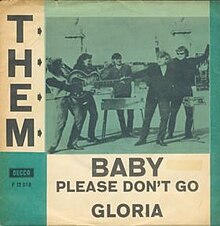Baby Please Don't Go
| "Baby, Please Don't Go" | |
|---|---|
 |
|
| Single by Joe Williams' Washboard Blues Singers | |
| B-side | "Wild Cow Blues" |
| Released | 1935 |
| Format | 10-inch 78 rpm |
| Recorded | Chicago, October 31, 1935 |
| Genre | Blues |
| Length | 3:22 |
| Label | Bluebird (B–6200) |
| Songwriter(s) | Unknown (traditional) |
| Producer(s) | Lester Melrose |
| "Baby, Please Don't Go" | |
|---|---|
 |
|
| Single by Them | |
| B-side | "Gloria" |
| Released | November 6, 1964 (UK) |
| Format | 7-inch 45 rpm |
| Recorded | October 1964 |
| Genre | Blues rock |
| Length | 2:38 |
| Label | Decca (F.12018) |
| Songwriter(s) | Unknown (traditional) |
| Producer(s) | Bert Burns |
"Baby, Please Don't Go" is a blues song which has been called "one of the most played, arranged, and rearranged pieces in blues history" by music historian Gerard Herzhaft. Its roots have been traced back to nineteenth-century American songs which deal with themes of bondage and imprisonment. Delta blues musician Big Joe Williams popularized the song with several versions beginning in 1935.
After World War II, Chicago blues and rhythm and blues artists adapted the song to newer music styles. In 1952, a doo-wop version by the Orioles reached the top ten on the race records chart. In 1953, Muddy Waters recorded the song as an electric Chicago-ensemble blues piece, which influenced many subsequent renditions. By the early 1950s, the song became a blues standard.
In the 1960s, "Baby, Please Don't Go" became a popular rock song after the Northern Irish group Them recorded it in 1964. Several music writers have identified Jimmy Page, a studio guitarist at the time, as participating in the recording, although his exact contributions are unclear. Subsequently, Them's uptempo rock arrangement also made it a rock standard. "Baby, Please Don't Go" has been inducted into both the Blues and Rock and Roll Halls of Fame.
"Baby, Please Don't Go" is likely an adaptation of "Long John", an old folk theme which dates back to the time of slavery in the United States. Blues researcher Paul Garon notes that the melody is based on "Alabamy Bound", composed by Tin Pan Alley writer Ray Henderson, with lyrics by Buddy DeSylva and Bud Green in 1925. The song, a vaudeville show tune, inspired several other songs between 1925 and 1935, such as "Elder Greene Blues", "Alabama Bound", and "Don't You Leave Me Here". These variants were recorded by Charlie Patton, Lead Belly, Monette Moore, Henry Thomas, and Tampa Red.
...
Wikipedia
